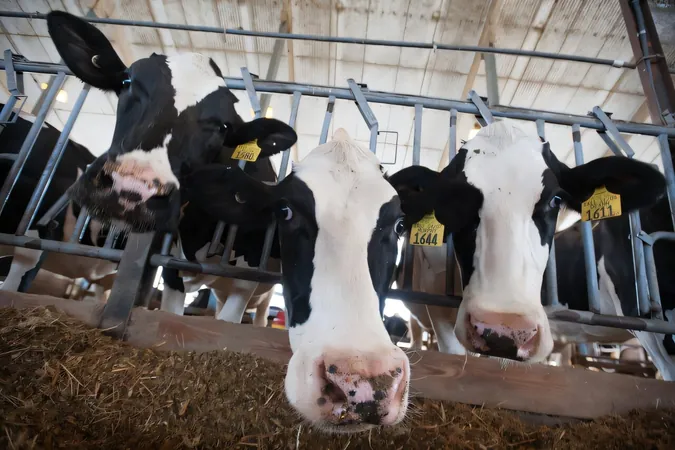
Revolutionary Sugar Solution Could Replace Antibiotics in Treating Dairy Cow Infections!
2024-12-19
Author: Jia
Groundbreaking Research from Penn State
A groundbreaking study from Penn State has unveiled that a concentrated sugar solution might be just as effective as antibiotics in treating a common infection in dairy cows. This revelation, published in the journal Frontiers in Veterinary Science, could potentially transform animal healthcare and combat the looming threat of antimicrobial resistance—a pressing concern in both human and veterinary medicine.
Implications of the Study
Lead researcher Adrian Barragan, an associate research professor and extension veterinarian at Penn State, emphasized the far-reaching implications of their findings. With antibiotic use strictly regulated in the organic dairy sector, adopting a sugar-based treatment could revolutionize practices and offer a beacon of hope against drug-resistant bacteria affecting not only animals but humans as well.
Targeting Clinical Metritis
The study specifically targets clinical metritis, an infection of the uterus that arises post-calving and has emerged as one of the leading welfare issues for dairy cattle in the United States. 'We aim to minimize antibiotic use while ensuring the health and welfare of the cows, which is critical for both the animals and the communities that depend on them,' commented Erika Ganda, co-lead author and assistant professor at Penn State.
Previous Treatment Practices
Historically, clinical metritis has been managed with systemic antibiotics like ceftiofur. While effective, reliance on these drugs raises the risk of developing antibiotic-resistant strains of bacteria, which could have dire consequences for public health. The new study sought to evaluate an alternative: intrauterine dextrose, a sugar solution.
Mechanism of Action
So how does this sugar solution work its magic? Dextrose plasmolyzes harmful bacteria by drawing water out of them, leading to their demise—a method that presents a novel approach to fight infections. Barragan noted that previous studies on this treatment yielded inconsistent results, yet this new research comes with promising news.
Study Details
Conducted on a dairy farm in central Pennsylvania, the study involved 77 cows suffering from clinical metritis. Each cow was randomly assigned to receive either intrauterine dextrose or traditional systemic ceftiofur. Remarkably, initial results indicated that both treatments shared similar clinical cure rates for mild cases of metritis. This unexpected finding sparked excitement among researchers, as it suggests that a sugar-based treatment could effectively alleviate infections while reducing the need for antibiotics.
Benefits of Dextrose
Moreover, Ganda highlighted an important benefit: unlike antibiotics, dextrose does not significantly disrupt the natural microbial balance in the reproductive tracts of cows. This preservation of microbiome integrity could have long-term health benefits, making dextrose a promising candidate for future treatments.
Future Research
While further research is imperative to fully harness the potential of dextrose for both veterinary and possibly human applications, the team is optimistic. 'Our findings pave the way for future studies exploring sugar-based treatments for human reproductive diseases too,' Barragan divulged, hinting at potential breakthroughs in medical treatments inspired by this innovative approach.
Conclusion
This study not only highlights the urgent need for alternative therapies amid escalating antimicrobial resistance but also champions a forward-thinking solution that may one day change the landscape of animal and human healthcare alike. Stay tuned as we closely monitor the evolution of this research—what does it mean for the future of antibiotics?





 Brasil (PT)
Brasil (PT)
 Canada (EN)
Canada (EN)
 Chile (ES)
Chile (ES)
 España (ES)
España (ES)
 France (FR)
France (FR)
 Hong Kong (EN)
Hong Kong (EN)
 Italia (IT)
Italia (IT)
 日本 (JA)
日本 (JA)
 Magyarország (HU)
Magyarország (HU)
 Norge (NO)
Norge (NO)
 Polska (PL)
Polska (PL)
 Schweiz (DE)
Schweiz (DE)
 Singapore (EN)
Singapore (EN)
 Sverige (SV)
Sverige (SV)
 Suomi (FI)
Suomi (FI)
 Türkiye (TR)
Türkiye (TR)